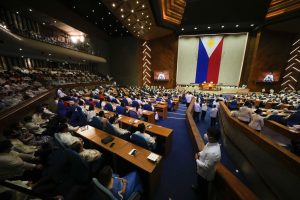Philippine President Ferdinand Marcos Jr. vowed to considerably ease poverty, boost economic recovery, and defend the country’s territory in his first key policy speech Monday that avoided contentious issues like human rights and pervasive corruption.
Amid soaring costs of living following the coronavirus pandemic and the global fallout from the Ukraine war, Marcos Jr. said “we can no longer afford another lockdown.”
“I do not intend to diminish the risks and challenges that we face in this turbulent time in global history,” he said, adding that “I see sunlight filtering through these dark clouds.”
With the “best Filipino minds” working in his administration, the president said, “We will endure.”
Activists rejected his upbeat outlook and criticized his silence on human rights issues, his plan to deal with decades-old communist and Muslim insurgencies, allegations of widespread extrajudicial killings, and his family’s legal troubles, including the non-payment of a huge estate tax.
They said scant details in his state of the nation address did not inspire public confidence.
The presidential speech “suffers from a crisis of clarity, direction, and vision,” the left-wing Akbayan group said, adding that Marcos Jr. offered “nothing new, bold, or extraordinary” to confront the country’s multiple crises.
About 5,000 flag-waving protesters marched ahead of his speech. They issued a range of demands, from government aid and fuel subsidy to justice for human rights victims under Marcos Jr.’s father, the late dictator who was ousted in a 1986 pro-democracy “People Power” uprising.
They asked Marcos Jr. to outline a clear roadmap out of the economic hardships.
More than 20,000 police, anti-riot contingents, and troops were deployed in metropolitan Manila, where a gun ban has been imposed, to secure the late-afternoon ceremony at the House of Representatives.
Thousands of pro-Marcos supporters were allowed to gather outside the heavily secured compound for a musical concert.
Marcos Jr. did not announce any new taxes, except on online services, and said the bureaucracy would be streamlined but did not specify if that included layoffs.
The Philippines will adopt an independent foreign policy, he said, and added: “I will not preside over any process that will abandon even a square inch of territory of the Republic of the Philippines to any foreign power.”
It was an obvious reference to Manila’s long-running feud with China and four other claimants in the disputed South China Sea.
He also promised to improve the country’s health system to deal with continuing coronavirus threats.
The Philippines has been among the countries worst-hit in Asia by the two-year pandemic after more than 60,000 deaths and extended lockdowns sent the economy to its worst recession in 2020 since World War II and worsened poverty, unemployment, hunger, and debts.
In a bid to boost agricultural output and foster economic growth, Marcos Jr. said he would order a one-year suspension of land and interest payments by farmers, who could then invest the money to boost production.
Marcos Jr. received more than 31 million votes of the more than 55 million cast in the May 9 election — a stunning victory for a family whose reputation was tarnished by their father’s legacy.
His allies strongly dominate both chambers of Congress. His cousin, Rep. Martin Romualdez, was elected the House speaker and another close ally, Juan Miguel Zubiri, as Senate president on Monday.
His huge electoral mandate, however, could be eroded if people don’t feel any significant relief from their hardships, University of the Philippines professor Jean Franco said.
“I’m not so sure how long the rest of the 31 million will latch on to Marcos Jr., especially if the economic crisis continues,” Franco said, adding the new president did not have the tough and populist image that kept the high ratings of his predecessor, Rodrigo Duterte.
Ferdinand Marcos was toppled in 1986 and died in 1989 while in exile in Hawaii without admitting any wrongdoing, including accusations that he, his family and associates amassed an estimated $5 billion to $10 billion while in office.

































